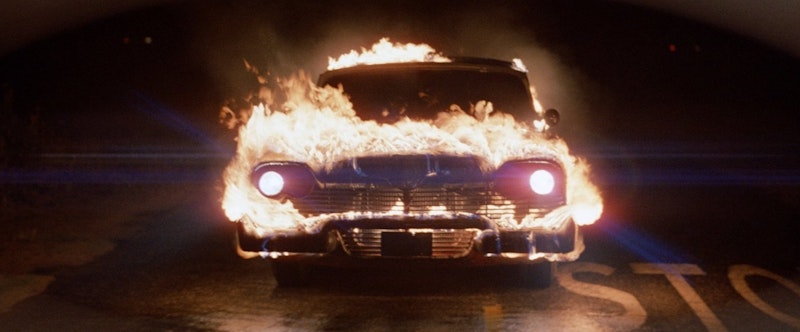“I love this car. Incredible memories. Every time I get in it I think about my dad and Beau. God, could my dad drive a car. The thing I like most is the setup here. It makes you feel in complete control."—Joe Biden, 2020 campaign ad
Second only to guns, cars are the national symbol of power, control, and virility. It’s no surprise that the sunset of the American empire has roughly coincided with the decline of its auto industry. Early in his presidency, Trump famously climbed into the driver seat of a Mack truck and held up his arms as if flexing his biceps, though it's unclear if he can see well enough to drive. Biden posed in his Stingray during the aforementioned campaign ad, though it's also unclear if he’s still able to drive. He did back it into the garage at the end of the ad, so advantage Joe?
These displays, however trivial on their surface, attempt to assuage the public’s growing fear that the USA is no longer Number One. Christine, John Carpenter’s adaptation of Stephen King’s novel about a murderous car, explores the car’s totemic significance in American culture. Carpenter suggests that men treat cars, like women, as objects of pride and envy mainly to sublimate our homoerotic feelings toward each other, and much like David Cronenberg did with Crash, Carpenter entwines the sex drive, the death drive, and literal driving to the point where they are practically indistinguishable.
Maybe the smartest choice Carpenter and King make is never giving Christine an explicit origin story, avoiding any-long winded expository dialogue about how the Chrysler plant was built on an Indian burial ground. Instead, we see her in the opening scene coming down the assembly line. In her seminal book Men, Women, and Chainsaws: Gender in the Modern Horror Film, Carol Clover notes that mechanics tinker with her from underneath, suggesting femininity beyond her name, and King lays it on pretty thick in writing her new owner Arnold "Cuntingham" Cunningham (Keith Gordon) as a bit feminine himself.
That all changes as Arnie brings Christine back to life and both get more macho and aggressive. Arnie starts wearing a leather jacket like the Fonz, drinking and beating people up for even suggesting he's too into his car. As Arnie spends more time behind the wheel, he relates less to the people around him, losing his girlfriend (Alexandra Paul) and eventually merging with Christine and going on a violent rampage. Like the more recent Spree, Christine understands how the impersonal nature of driving a car can bring out a person's worst self.
King said he chose the ‘58 Plymouth Fury because it was the "forgotten car," not iconic like the Stingray or Thunderbird. Carpenter, with his special They Live sunglasses, saw all the racism, misogyny, and male chauvinism—not to mention the sexual repression undergirding all those things—lurking beneath that mourning of a "forgotten" America and the wave of 1950s nostalgia that was hitting its peak in the 1980s. Arnie and Christine are riding that wave into death and taking everyone they can with them.
Sound familiar? In the past decade of protests against police brutality, we’ve seen several people strike protesters with their cars (and dozens more try). Could Carpenter have predicted how central a role the car would play in acts of reactionary terrorism? Who knows, but I think he gets that there’s nothing more American than running someone over with your car.
It’s tempting to believe that Carpenter made Christine (along with They Live) deliberately not scary, as a sort of distancing device to get people to pay more attention to the broader themes and ideas. Maybe that's giving him too much credit, but it’s unclear how else one should read the absurd homoeroticism of Arnie’s buddy Dennis (John Stockwell) mounting Christine from behind in a tractor. By the end, Dennis has presumably "gotten the girl" by being vulnerable (just as Arnie loses her in going macho), but Carpenter spares us any big embrace between the two, and the final scene feels much more like Dennis has lost a lover than gained one.
The same scene depicts Christine as a compacted cube, unable to fully regenerate but still rattling and haunted–as apt a metaphor for the state of our American empire as any.

